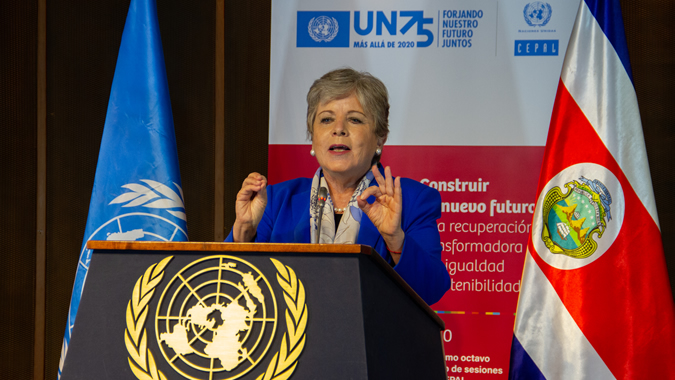SANTIAGO, Chile — Premiers and senior government officials from the Caribbean’s non-independent territories have called for sustained cooperation in advancing resilient and sustainable development and identifying common responses to the COVID-19 pandemic, during a high-level meeting with Alicia Bárcena, the Executive Secretary of the Economic Commission for Latin America and the Caribbean (ECLAC), and the Chair of the Commission, Costa Rica. United Nations’ Resident Coordinators and intergovernmental organizations serving the Caribbean also participated.
Bárcena participated in the “High-level meeting on the challenges faced by Associate Members of ECLAC in the implementation of the 2030 Agenda for Sustainable Development” ahead of the fourth meeting of the Forum of the Countries of Latin America and the Caribbean on Sustainable Development 2021 being held online from March 15 to 18.
Welcoming the Associate Members of ECLAC, Bárcena emphasized the Commission’s commitment to “engage more meaningfully with all members of the ECLAC family towards sharing a comprehensive strategy for recovery post-COVID-19 in order to achieve the 2030 Agenda.” She remarked that “the pandemic presents us with an opportunity to redefine established norms and realign priorities, while driving necessary transformation towards a more resilient and dynamic development framework … [and] has also underscored the fact that we need to extend a hand of support to all peoples; to all countries, regardless of legal or political status.”

In her remarks, Bárcena noted that, as territories, ECLAC’s fourteen Associate Members had more limited opportunities and scope for redress but faced all the profound development challenges experienced by the wider membership of the Caribbean. She noted that ECLAC’s Caribbean First Strategy was dedicated to promoting more focused attention on the unique challenges facing the small vulnerable countries and territories of the subregion, and that over the past few years ECLAC had steadfastly included its Associate Members in the work of the Commission as well as regional forums such as the one taking place that week. Among other examples of ECLAC’s work, she highlighted the damage and loss assessments carried out by the Commission’s subregional headquarters for the Caribbean following Hurricanes Irma and Maria just over three years ago in Anguilla, British Virgin Islands, Sint Maarten, and Turks and Caicos Islands.
The meeting today was presided over by Andrew Fahie, Premier and Minister of Finance of the British Virgin Islands, in his capacity as Vice-Chair of the Caribbean Development and Cooperation Committee (CDCC) of ECLAC, with the support of Christian Guillermet-Fernández, Deputy Minister for Multilateral Affairs in the Ministry of Foreign Affairs and Worship of Costa Rica and Chair of ECLAC.
Other participants included Rodolfo Sabonge, Secretary-General of the Association of Caribbean States (ACS), Dr. Douglas Slater, Assistant Secretary-General for Human and Social Development of the Caribbean Community (CARICOM) Secretariat, and Stephen Fevrier, Ambassador, Permanent Delegation of the Organisation of Eastern Caribbean States (OECS) to the United Nations in Geneva.
The meeting was also attended by four Caribbean Member States of ECLAC, and UN Resident Coordinators serving the subregion, including Didier Trebucq for Barbados and the Eastern Caribbean, Garry Conille for Jamaica, Bahamas, Bermuda, the Cayman Islands and Turks and Caicos Islands, and Marina Walter for Trinidad and Tobago, Suriname, Aruba, Curaçao and Sint Maarten.
In opening the meeting, Andrew Fahie, Premier of the British Virgin Islands, stated “this meeting is a decisive milestone marking ECLAC’s renewed engagement with its Associate Members and the tremendous efforts of Costa Rica as the current Chair of ECLAC to deepen the inclusion and participation of the Associate Members in the sustainable development of Latin America and the Caribbean.” He added that the Associate Members’ involvement in ECLAC “is meant to help strengthen the resilience of their societies through support measures and participation in the regional processes designed to help achieve greater economic and social development.”
Statements of ECLAC’s Associate Member countries echoed that view and drew attention to the significant economic, social and environmental vulnerabilities, high exposure to extreme weather events and climate change, and low levels of resilience experienced by Caribbean territories – factors which combined to paint a complex picture along with the unprecedented challenge of the COVID-19 pandemic.
Outlining ECLAC’s initiatives in support of Caribbean resilience-building, Diane Quarless, Chief of the ECLAC subregional headquarters for the Caribbean, noted that ECLAC’s Associate Members were challenged by limited financial resources and an increasing debt burden due to the sudden collapse of sectors such as tourism, transportation, and construction as a result of the pandemic. She nonetheless underscored that the Caribbean had been at a crossroads before, and could meet the challenge of both surviving the COVID-19 crisis and staying the course towards achieving the 2030 Agenda.
Adding to those reflections on the Caribbean’s post-pandemic prospects, Bárcena stated that “the task ahead of us is a daunting but noble one, and the return on investing in our people and in sustainable development will be much greater than the cost of not doing so. We must remain resolute in our determination to build forward better.”
More information:
· High-level meeting on the challenges faced by Associate Members of ECLAC in the implementation of the 2030 Agenda for Sustainable Development.
· Video of the meeting (live transmission).
· Fourth meeting of the Forum of the Countries of Latin America and the Caribbean on Sustainable Development 2021 (website).
